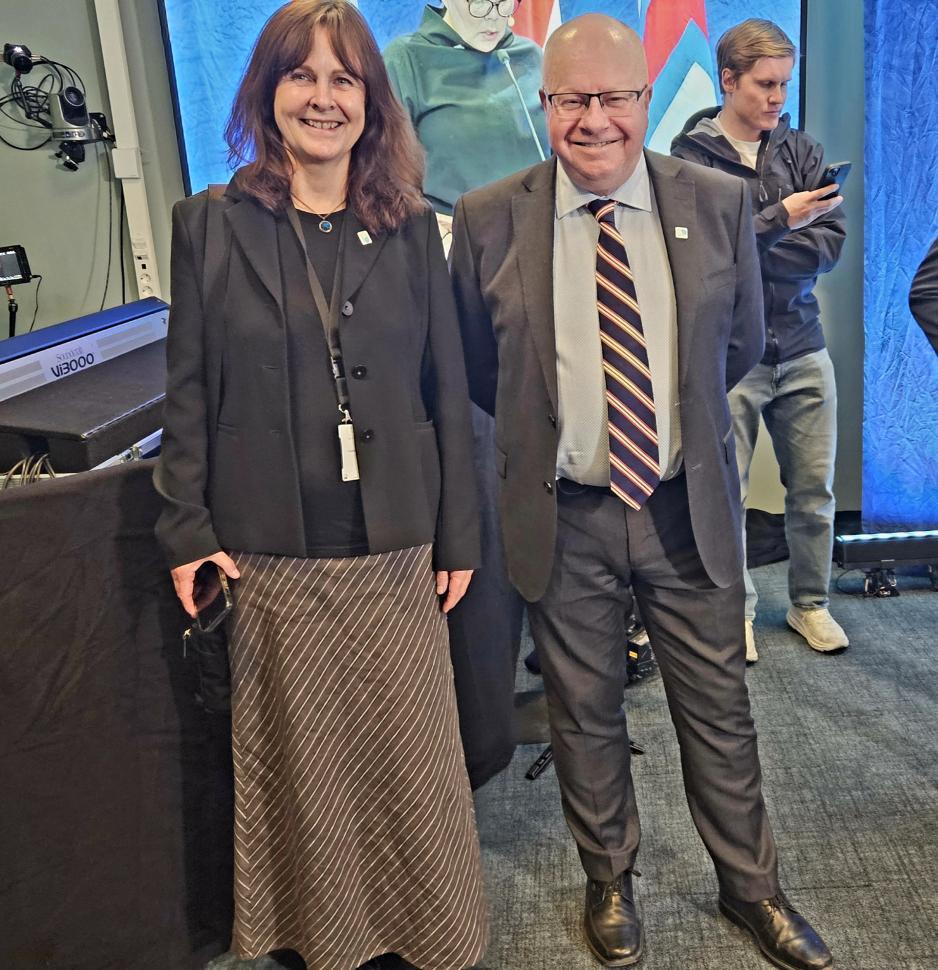Arne O. Holm says The Arctic Council Survives Both Vladimir Putin and Donald Trump

Denmark's work in the Arctic Council will be led from Greenland. Here, Greenland's Foreign Minister, Vivian Motzfeldt, is in front of the Danish, Greenlandic, and Faroese flags. (Photo: Arne O. Holm)
Comment: They stood humble, but smiling in the background, Norway's Morten Høglund and Solveig Rossabø, when Denmark took over the chairship of the Arctic Council on Monday. In front of them, on stage, the Norwegian MFA Espen Barth Eide had just presented a collection of non-committal political platitudes, or a closing statement as it is officially called.
This is an opinion piece written by a member of the editorial staff. All views expressed are the author's own.
But that did not matter in the euphoria that characterized Norway's final day as the chair of the Arctic Council.
The only thing that mattered was that the council had survived a Russian full-scale war against a neighboring country, and now with ambitions to also survive Donald Trump as the US president.
In the political landscape, binding statements must give way for the will to survive as an organization, or council, across country borders in the North.
Closed meeting
The MFAs from the eight Arctic states, who usually have met when the baton was to be handed over to a new country, were replaced by ambassadors with no political responsibility this time.
In addition to, and this is important and special for the Arctic Council work, six permanent representatives for Arctic indigenous institutions.
A collection of non-committal political platitudes was what it took.
The meeting was, as emphasized repeatedly by Espen Barth Eide, a closed one. He did not want to elaborate on it.
But we have some information.
When Norway presented its proposal for a concluding statement ahead of yesterday's meeting, it was 12 pages long. After it had been processed and ground by the various countries, it ended up at about four pages.
Eight pages had to be cut to be edible, not least for Russia and the USA.
Or as Norway's Arctic Ambassador, Morten Høglund, said during a reception after the Arctic Council meeting:
"We decided to focus on what we could do instead of what we could not do."
The concluding statement was cut from 12 to four pages.
That has proved to be a successful recipe.
Survival
Inside the closed meeting, both the national and indigenous representatives took the floor, one after the other. Everyone had the same message. The Arctic Council was not going to merely survive.
The work, now under the auspices of Denmark, Greenland, and the Faroe Islands, would continue.
In the past couple of years, Russia has worked actively to strengthen non-Arctic states' influence on the Arctic Council. This time, the Russian delegate was more open.

Humbly in the background: Senior Arctic Official Solveig Rossabø and Norway's Arctic Ambassador, Morten Høglund. (Photo: Arne O. Holm)
He referred to China in his presentation, but concluded by stating that the eight Arctic states decide the council's future.
With a climate denier in the White House in Washington, it was also worth noting that the American delegation addressed the consequences of climate change in their presentation, particularly the wildfires that are plaguing the US.
Perhaps he saved his job by not pointing out the reasons for the climate running amok. Just the symptoms.
And that is precisely how one must read the declaration on the climate challenges in the Arctic. In turn, the consequences of climate change are pointed out. The causes of this attack and how it should be addressed are not mentioned.
Perhaps it disappeared during the work leading up to Monday's meeting.
Acrobatic work to be done.
Acrobatic work
After the official press conference, I asked Greenland's MFA, who is to lead the Arctic Council work in the coming two years, whether the USA's ambitions to take over Greenland will create political challenges for the work.
Vivian Motzfeldt thought long and hard before answering "maybe."
There is a dimension to the almost acrobatic work that is to be conducted over the next couple of years. Not only is it to be balanced against the USA and Russia. For Greenland, it must also be balanced against the Kingdom of Denmark.
Anyways. At a time when international cooperation is under immense pressure, and where weapons replace dialogue, there is all the reason to wish the Arctic Council good luck in the future. Norway created a good foundation for continued cooperation.
Greenland, the Faroe Islands, and Denmark have accepted a major and important responsibility to carry it on.


